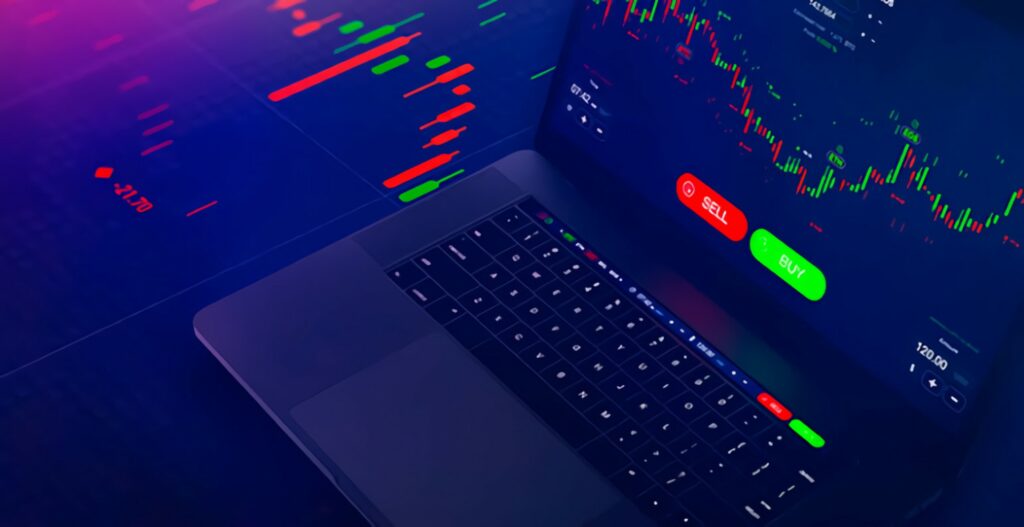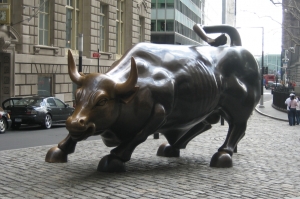By Jacob Winton
In 2004, the Wall Street Journal published an article titled U.S. Senators’ Stock Picks Outperform the Pros, reporting on an academic study that detailed the uncanny success of stock portfolios owned by United States Senators.[1] “Politicians may have done a poor job improving the government’s bottom line,” the opening line quipped, “but they seem to be doing quite well with their own.”[2] Financial disclosure forms from 1993 to 1998 showed not only that members of the US Senate saw higher returns than average Americans, but that they beat the market by an average of twelve percent per year, outperforming professional money managers by a factor of two.[3]
These Senators “appeared to know exactly when to buy or sell their holdings” in anticipation of fluctuations in the market.[4] One of the study’s four authors, Professor Alan Ziobrowski, stated the obvious: “I don’t think you need much of an imagination to realize that they’re in the know.”[5] Indeed, our elected officials are often privy to nonpublic information bound to trigger shifts in the market upon public release,[6] and studies like this one indicate that, for decades, legislators have been routinely converting their confidential access into personal financial gain.[7]
In 2010, the Wall Street Journal published another article, this time focusing on suspicious trades by congressional staffers with “ringside seats on the making of laws that affect American business.”[8] An analysis of over 3,000 disclosure forms covering trading by Capitol Hill staffers in 2008 and 2009 showed that “[a]t least 72 aides on both sides of the aisle traded shares of companies that their bosses help oversee.”[9] Importantly, the article also stated that existing insider trading laws did not apply to Congress, a claim that “set the blogosphere and mainstream media on fire.”[10]
Although the idea that Congress had exempted itself from insider trading laws came to be treated as conventional wisdom,[11] it was a falsehood. For one thing, Congress could not have immunized itself from insider trading laws because “Congress ha[d] never enacted a federal securities law that explicitly prohibits anyone from insider trading.”[12] Instead, Congress allowed insider trading to be prosecuted under SEC Rule 10b-5, promulgated pursuant to section 10(b) of the Securities Exchange Act of 1934,[13] which generally prohibits fraud or deception in connection with the purchase or sale of any security.[14]
Violations of Rule 10b-5 may be prosecuted as a civil offense by the SEC or as a crime by the Department of Justice.[15] As a result, “U.S. insider trading law [was] almost entirely judge-made.”[16] Nevertheless, it did not exempt Congress. The Supreme Court had recognized two theories under which insider trading violates Rule 10b-5.[17] The classical theory prohibits trades on nonpublic, corporate information because “the relationship between a corporate insider and the stockholders of his corporation gives rise to a disclosure obligation.”[18] On the other hand, the misappropriation theory premises liability upon a duty to the informational source, prohibiting any “self-serving use of a principal’s information to purchase or sell securities, in breach of a duty of loyalty and confidentiality, [which] defrauds the principal of the exclusive use of that information.”[19]
Professor Donna Nagy has outlined a persuasive argument that these two theories of liability cover congressional insider trading because of the “fiduciary-like” duties that members of Congress and legislative staffers owe to the public, to the federal government, and to other government officials.[20] Nevertheless, in 2012, Congress passed the Stop Trading on Congressional Knowledge (“STOCK”) Act, placing explicit restrictions on trading by legislators and congressional staffers.[21] The bill was introduced in its initial form by U.S. Representatives Brian Baird (D-Wash.) and Louise M. Slaughter (D-N.Y.) in 2006, at which time Representative Slaughter released a statement announcing the legislation and illustrating its general purpose:
“Congressman B learns that the Chairman of the Appropriations Committee has decided to provide a multi-million dollar defense contract for Company A in the Defense Appropriations bill. This information has not been released to the public, but will almost certainly drive Company A’s stock price up when it becomes public knowledge. Congressman B buys stock in Company A. THIS IS NOT ILLEGAL UNDER CURRENT INSIDER TRADING LAWS, AND IS WHAT THE LEGISLATION ADDRESSES.“[22]
As enacted, the STOCK Act provides in no uncertain terms that “Members of Congress and employees of Congress are not exempt from the insider trading prohibitions arising under [Rule 10b-5]” and explicitly affirms “a duty arising from a relationship of trust and confidence owed by each Member of Congress and each employee of Congress.”[23] At the signing ceremony, President Obama conveyed the importance of the new law:
“The STOCK Act makes it clear that if members of Congress use nonpublic information to gain an unfair advantage in the market, then they are breaking the law. It creates new disclosure requirements and new measures of accountability and transparency for thousands of federal employees. That is a good and necessary thing. We were sent here to serve the American people and look out for their interests—not to look out for our own interests.”[24]
Yet, reports indicate that public officials have continued to grow and protect their personal wealth by trading on information unavailable to the investing public.[25] Indeed, the early days of the COVID-19 pandemic shed new light on this form of corruption.[26]
Senate Intelligence Committee Chairman Richard Burr (R-N.C.), for example, co-authored an op-ed on February 7, 2020 in which he publicly reassured the American people that “the United States today is better prepared than ever before to face emerging public health threats, like the coronavirus.”[27] At a private luncheon around that same time, however, Senator Burr warned attendees that the coronavirus “is much more aggressive in transmission than anything that we have seen in recent history . . . . It is probably more akin to the 1918 pandemic.”[28] Acting on the beliefs expressed privately, the Senator picked up between $628,000 and $1.72 million in cash by dumping a large share of his personal holdings on February 13, the week before financial markets began to tank in response to worsening news about the spread of COVID-19.[29]
In addition, the Department of Justice opened probes into the propriety of trades made by Senators Dianne Feinstein (D-Ca.), Kelly Loeffler (R-Ga.), and James Inhofe (R-Ok.), all of whom transferred hundreds of thousands of dollars’ worth of assets after being briefed by public health officials on the nature and scope of the emerging pandemic.[30] At least 75 members of Congress or their spouses “bought or sold stock in companies that make COVID-19 vaccines, treatments, and tests in the weeks before and after the pandemic gripped the US.”[31] The same trend has emerged around the current Russian invasion of Ukraine.[32]
Recent events underscore the apparent prevalence of corrupt trading in Congress and the impotence of current insider trading laws.[33] Violations of the STOCK Act are punishable by fine, but the penalty is negligible and is often waived by House or Senate ethics officials.[34] In response to calls from ethics watchdogs and lawmakers to tighten restrictions and increase penalties, a serious debate has emerged on Capitol Hill over an outright ban on federal lawmakers’ ability to trade stocks.[35]
That debate is important because even the “simple perception that officials might have prioritized their own financial well-being over the well-being of American households is damaging enough, even if the trades were innocuous.”[36] A recent poll found that seventy-six percent of voters believe that lawmakers have an “unfair advantage” in the stock market and only five percent of respondents thought legislators should be able to trade stocks.[37] When House Speaker Nancy Pelosi (D-Ca.) was asked in December of 2021 whether members of Congress should be banned from trading stocks, she responded simply, “no,” adding that “we are a free market economy. They should be able to participate in that.”[38] However, after opposing the effort for months, she relented due to growing pressure coming from within the Democratic party.[39] In response, “there has been a push by both parties, in both houses of Congress, to establish stronger guardrails on congressional stock ownership.”[40]
“The fix is simple and obvious,” writes The Atlantic’s Annie Lowrey.[41] “Just don’t let public officials be active investors.”[42] Senators Jon Ossoff (D-Ga.) and Mark Kelly (D-Az.) introduced legislation to that end on January 12, 2022.[43] That law would require members of Congress and their families to place their stock portfolios into blind trusts for the duration of their term in office (allowing them to benefit from participation in the market while disallowing the abuse of nonpublic information) and would punish violations with a fine equal to the member’s entire congressional salary.[44] The Ossoff-Kelly bill is one of many.[45] Encouragingly, in the wake of the first House hearing on congressional insider trading on April 7, 2022, a bipartisan group of lawmakers has called on House leadership to swiftly bring a trading ban bill to the floor.[46]
Predictably, however, these efforts have been met with opposition.[47] House Majority Leader Steny Hoyer (D-Md.) came out against a trading ban, declaring that “members ought not to be in a different situation that they would otherwise be if they weren’t members of Congress.”[48] But that argument is a nonstarter. Members of Congress are not free to prioritize their own interests in the same way as civilians. Their situation is inherently different because they are vested with the trust and confidence of both the federal government and the American electorate; they occupy a unique position of power and there is every reason to guard against the abuse of that power. It should be uncontroversial to state that all forms of profiteering by public officials are unacceptable and should be disallowed. If one accepts that basic premise, then banning members of Congress from trading stocks is a small and obvious step in the right direction.
[1] Jane J. Kim, U.S. Senators’ Stock Picks Outperform the Pros’, Wall St. J. (Oct. 26, 2004, 12:01 AM), https://www.wsj.com/articles/SB109874916042455390.
[2] Id.
[3] Id. (During the “boom years of the 1990s” senators outperformed the market by 12%, money managers outperformed the market by 6%, and U.S. households underperformed the market by 1.4%.).
[4] Id.
[5] Id.
[6] “Examples of this kind of information include classified briefings about national security issues, advance knowledge of regulatory actions, and nonpublic details about legislation, appropriations and tax policy.” Ylan Mui & Christina Wilkie, Congress Moves to Ban Members from Trading Stocks as Pelosi Drops Opposition, CNBC (Feb. 9, 2022, 9:41 AM), https://www.cnbc.com/2022/02/09/congress-moves-towards-banning-members-from-trading-stocks.html.
[7] See, e.g., Annie Lowrey, An Invitation to Corruption, The Atlantic (Mar. 20, 2020), https://www.theatlantic.com/ideas/archive/2020/03/congress-insider-trading-problem/608488/ (“One analysis of 61,998 stock trades made from 2004 to 2010, for instance, showed that politicians outperformed the market by 20 percent, with the portfolios of high-ranking Republicans beating the market by a whopping 35 percent.”).
[8] Brody Mullins et al., Congressional Staffers Gain from Trading in Stocks, Wall St. J. (Oct. 11, 2010, 12:01 AM), https://www.wsj.com/articles/SB10001424052748703431604575522434188603198.
[9] Id.
[10] Donna M. Nagy, Insider Trading, Congressional Officials, and Duties of Entrustment, 91 Bos. U. L. Rev. 1105, 1107 (2011).
[11] Id. at 1108. For example, Former SEC Commission Chairman Arthur Levitt proclaimed in a Bloomberg radio broadcast that “members of Congress and their staffs … benefit from an exemption that the average investor doesn’t benefit from. They’re immune from insider trading laws.” Id.
[12] Id. at 1109 (emphasis in the original).
[13] 15 U.S.C. § 78j(b).
[14] Nagy, supra note 10, at 1109; see 17 C.F.R. § 240.10b-5.
[15] Nagy, supra note 10, at 1109.
[16] Id. at 1110.
[17] See generally Chiarella v. United States, 455 U.S. 222 (1980) (classical theory); United States v. O’Hagan, 521 U.S. 642 (1997) (misappropriation theory).
[18] Chiarella, 455 U.S. at 227 (highlighting “the unfairness of allowing a corporate insider to take advantage of that information by trading without disclosure”); see also Nagy, supra note 10, at 1110 (“Pursuant to this ‘classical theory,’ persons who owe duties of trust and confidence to an issuer’s shareholders must either disclose all material nonpublic information in their possession or abstain from trading in the issuer’s shares.”).
[19] O’Hagan, 521 U.S. at 652.
[20] Nagy, supra note 10, at 1109–11 (“almost all instances of real or hypothesized congressional insider trading can fit squarely within either the classical or misappropriation theory paradigms under Rule 10b-5”).
[21] Stop Trading on Congressional Knowledge (“STOCK”) Act of 2012, Pub. L. No. 112-105, 126 Stat. 291.
[22] Nagy, supra note 10, at 1130.
[23] STOCK Act § 4.
[24] Matt Compton, President Obama Signs the STOCK Act, The White House Blog (April 4, 2012 5:16 PM), https://obamawhitehouse.archives.gov/blog/2012/04/04/president-obama-signs-stock-act.
[25] See generally Dave Levinthal, 59 Members of Congress Have Violated a Law Designed to Stop Insider Trading and Prevent Conflicts-of-Interest, Bus. Insider (Mar. 23, 2022, 1:18 PM), https://www.businessinsider.com/congress-stock-act-violations-senate-house-trading-2021-9; Congressional Trading in 2021, Unusual Whales (Jan. 10, 2022), https://unusualwhales.com/i_am_the_senate/full; see also Valera Voce, Congressmen Used Insider Knowledge to Profit from War in Ukraine, The Mountain (Mar. 11, 2022), https://themountain.news/news/congressmen-used-insider-knowledge-to-profit-from-war-in-ukraine.
[26] See, e.g., Robert Faturechi & Derek Willis, Senator Dumped Up to $1.7 Million of Stock After Reassuring Public About Coronavirus Preparedness, ProPublica (Mar. 19, 2020, 5:01 PM), https://www.propublica.org/article/senator-dumped-up-to-1-7-million-of-stock-after-reassuring-public-about-coronavirus-preparedness; Jack Kelly, Senators Accused of Insider Trading, Dumping Stocks After Coronavirus Briefing, Forbes (Mar. 20, 2020 12:41 PM), https://www.forbes.com/sites/jackkelly/2020/03/20/senators-accused-of-insider-trading-dumping-stocks-after-coronavirus-briefings/.
[27] Senator Lamar Alexander & Senator Richard Burr, Coronavirus Prevention Steps the U.S. Government Is Taking to Protect You, Fox News (Feb. 7, 2020, 12:25 PM), https://www.foxnews.com/opinion/coronavirus-prevention-steps-the-u-s-government-is-taking-to-protect-you-sen-alexander-and-sen-burr.
[28] Faturechi & Willis, supra note 26.
[29] Lowrey, supra note 7.
[30] Ryan Lucas, Justice Department Closes Investigations of 3 Senators; Burr Inquiry Continues, NPR (May 26, 2020, 5:31 PM), https://www.npr.org/2020/05/26/862692569/justice-department-closes-investigations-of-3-senators-burr-inquiry-continues.
[31] Dave Levinthal, Ban Federal Lawmakers and their Family Members from Trading Stocks, 37 Former Lawmakers tell Congress, Bus. Insider (Apr. 6, 2022, 11:00 AM), https://www.businessinsider.com/congress-stock-trade-ban-lawmakers-issue-one-2022-4.
[32] Id.
[33] See Insider Trading, Congress and COVID-19: A Renewed Focus on the STOCK Act, Foley Hoag LLP (April 15, 2020), https://foleyhoag.com/publications/alerts-and-updates/2020/april/insider-trading-congress-and-covid19-a-renewed-focus-on-the-stock-act.
[34] Levinthal, supra note 25.
[35] Id.
[36] Lowrey, supra note 7 (emphasis in the original).
[37] Karl Evers-Hillstrom, Three in Four Voters Support Banning Lawmakers from Trading Stocks: Poll, The Hill (Jan. 6, 2022, 4:05 PM), https://thehill.com/homenews/news/588630-76-percent-of-voters-support-banning-lawmakers-from-trading-stocks-poll/.
[38] Press Release, Speaker of the House Nancy Pelosi, Transcript of Speaker Pelosi’s Remarks at Weekly Press Conference (December 15, 2021), https://www.speaker.gov/newsroom/121521-0.
[39] See Steven T. Dennis et al., Stock-Trading Ban for Congress Hits Pushback from Right and Left, Bloomberg (Feb. 9, 2022, 5:36 PM), https://www.bloomberg.com/news/articles/2022-02-09/stock-trading-ban-for-congress-hits-pushback-from-right-and-left.
[40] The Editorial Board, Members of Congress Should Not be Trading Stocks, Ever, N.Y. Times (Feb. 18, 2022), https://www.nytimes.com/2022/02/18/opinion/congress-stock-trading-ban.html.
[41] Lowrey, supra note 7.
[42] Id.
[43] Press Release, Senator Jon Ossoff, Sens. Ossoff, Kelly Introduce Bill Banning Stock Trading by Members of Congress.
[44] Id.
[45] Bryan Metzger, A Bipartisan Group of 19 Lawmakers Is Laying Out 3 Key Parameters for a Stock Trading Ban Following the House’s First Hearing on the Issue, Bus. Insider (Apr. 13, 2022, 11:09 AM), https://www.businessinsider.com/19-bipartisan-lawmakers-stock-ban-letter-golden-spanberger-hearing-2022-4 (“At least 20 bills have been introduced that address some of these issues.”).
[46] Id.; Kimberly Leonard & Dave Levinthal, Here Are 6 Things to Watch as Congress Considers Banning Lawmakers from Trading Stocks, Bus. Insider (Apr. 6, 2022, 3:07 PM), https://www.businessinsider.com/congress-trading-stocks-nancy-pelosi-kevin-mccarthy-zoe-lofgren-2022-4.
[47] See Dennis, supra note 39.
[48] Mike Lillis, Joining Pelosi, Hoyer Says Lawmakers Should Be Free to Trade Stocks, The Hill (Jan. 19, 2022, 1:57 PM), https://thehill.com/homenews/house/590428-joining-pelosi-hoyer-says-lawmakers-should-be-free-to-trade-stocks/?rl=1.



